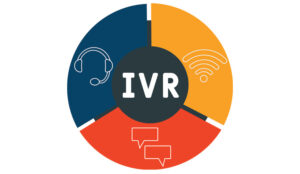Noble Systems introduce us to the basics of IVR before naming the top benefits of having an intelligent IVR.
What Is an IVR?
Some people new to the contact centre industry might be wondering ‘what does IVR stand for?’ This common acronym stands for interactive voice response.
IVR is an automated system generally used by contact centres that answers incoming calls and then provides a recorded message with options for the caller.
Callers can input their response via their telephone keypad (touch-tone) or using voice commands. The IVR system will then transfer the call via call routing to either an agent or self-serve application.
An IVR is often the first interaction between a caller and an organization when calling into a call centre, therefore it can influence the caller’s perception through its tone of voice and ease of use.
An effective call centre has the IVR integrated with the CRM and other contact centre systems. A well-tuned IVR can provide a number of benefits for the call centre.
1. Intelligent Call Routing
When linked to your CRM, IVR technology can intelligently route calls based on the caller’s telephone number. This means that calls can automatically be directed to the last consultant spoken to, VIP callers can be placed at the front of the calling queue, or calls can be directed to a specific consultant that speaks a particular language – the options are endless.
Intelligent routing that is optimized for your customer journey can lower abandon rates, reduce queue times for calls, and provide tailored callback options for times of particularly high call volume.
2. Support for Busy Times and Disaster Recovery
IVR contact centre technology gives organizations options for their callers to self-serve and leave messages.
In times of high demand due to emergencies or seasonal peak activity, the IVR service can support the contact centre by easing pressure on your agents.
Simple tasks can be automated, such as common customer questions regarding account information, order status, or payment due dates. A modern IVR service can ensure that during these peak times, messages and menu options can be quickly and easily modified.
An IVR can be invaluable during times of disaster recovery. A pre-programmed alternative route can be activated in the event of an emergency so that selected calls can be routed to an alternative call centre or to staff working from home during severe weather or epidemics such as COVID-19.
3. Improving the Customer Journey
Traditionally IVRs have a bad reputation. Poorly planned systems can frustrate callers with their complex and clunky designs.
Today, IVRs are revolutionizing the customer journey with clear messages that reflect the organization’s brand, providing an effective self-service tool.
The key to enhancing the customer journey is that if the caller does need to speak to an agent, the information is seamlessly transferred and presented to the best agent to handle the query.
This greatly improves productivity and reduces caller frustration. In addition, an IVR allows callers to self-serve outside of your standard business hours, enabling your organization to be available 24 x 7 x 365.
An IVR also allows you to create rules to route certain callers through the automated system for faster service or for special needs.
These can be prioritized based on criteria, such as customer status, level of debt, or perceived vulnerability based on previous interactions.
4. Measuring Customer Satisfaction
If Customer Satisfaction (CSAT) scores are important to your organization, an IVR survey after each interaction will help to provide accurate satisfaction scores.
These scores can be reported on by an agent, which can help with training or rewards programs.
Another way to improve customer satisfaction and reduce dropped calls and hang-ups is by enriching the on-hold experience.
Virtual ‘assistants’ can make wait time announcements and manage callback requests. An “agentless” system allows you to make special offers, send reminders and welcome messages, or complete collection calls without pulling agents away from other services.
5. Improve Morale by Freeing Consultants From Mundane Tasks
An IVR can route routine calls and common questions, allowing callers to self-serve and freeing up agents to handle more complex calls or questions via multiple channels.
It can significantly improve efficiency and provide agents with more meaningful work rather than repetitive questions, such as account balances, confirming appointment times, or collecting payments.
With text to speech (TTS) or automated speech recognition (ASR) technology, your virtual agents can quickly and accurately understand a caller’s request and either respond to their request immediately or direct them to a live agent with all the caller’s relevant information pushed to their screen, eliminating manual look-ups.
Ongoing IVR testing of the call-flow manager is important to ensure that you continue to enhance the customer journey, rather than annoy customers with an ineffective IVR.
It’s important that your organization adapts to change. A modern IVR system should allow managers to modify call-flows and menus based on caller feedback or the evolution of the brand/message.
Ensure your solution gives you the freedom to create intricate IVR flows, launch menus, make recordings, define subscript routing, and define help tables all using a simple point-and-click user interface, so you don’t have to run to the IT department or learn web development every time you need an update.
Author: Robyn Coppell
Published On: 27th May 2020 - Last modified: 11th Jun 2020
Read more about - Guest Blogs, Noble Systems















